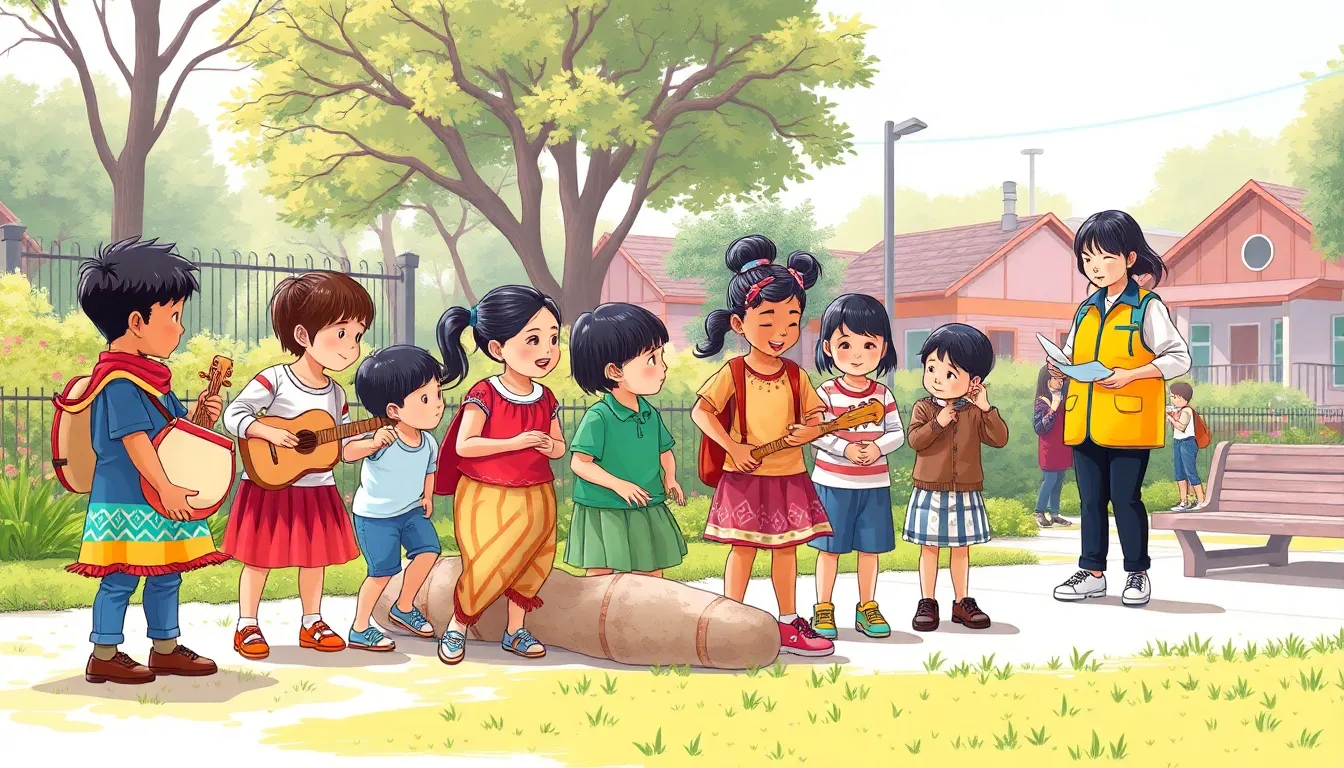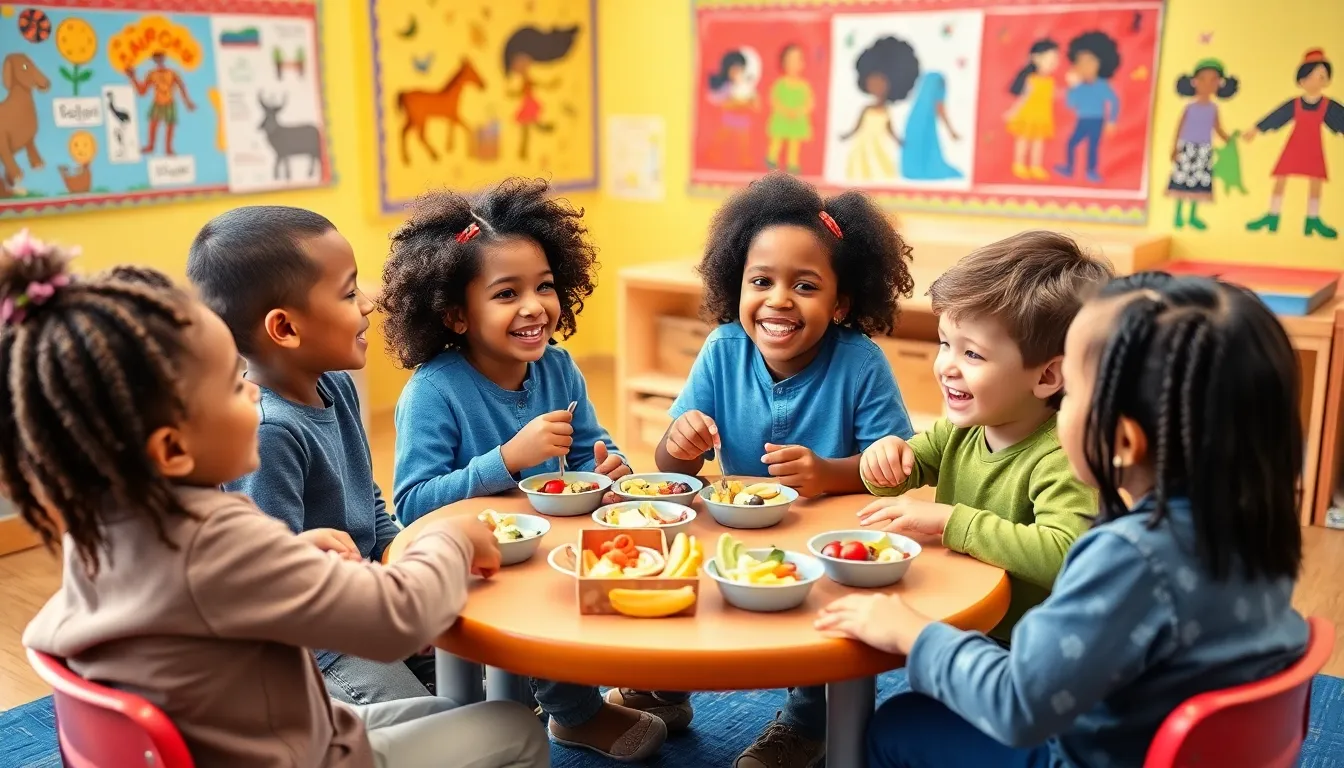Table of Contents
ToggleIn a world bursting with colors, shapes, and the occasional crayon masterpiece on the wall, preschoolers are natural explorers. But what if these little adventurers could dive into the fascinating realm of social studies? It’s not just about maps and history; it’s about understanding people, cultures, and the big, beautiful world around them. Imagine a classroom where tiny hands learn to appreciate diversity while sharing snack time—now that’s a recipe for lifelong friendships!
Importance Of Social Studies For Preschoolers
Engaging preschoolers in social studies promotes essential skills and understanding of their world. This subject nurtures curiosity while exposing them to various cultures and societies.
Cognitive Development
Social studies enhance cognitive development in preschoolers. Through exploring diverse communities and traditions, children broaden their thinking. Activities that involve storytelling or role-playing promote critical thinking skills. These experiences encourage them to ask questions and explore answers. Learning about differences and similarities among people fosters analytical skills. Cognitive growth occurs as kids connect concepts and apply knowledge in interactive settings.
Social Skills Enhancement
Development of social skills stems from social studies activities. Young children practice communication and collaboration during group projects. Sharing ideas and respecting differing opinions cultivates essential interpersonal abilities. Learning about empathy and acceptance encourages preschoolers to build friendships. Participation in community-focused activities strengthens their sense of belonging. Through these experiences, they become more adept at navigating social interactions. Engaging in discussions about family and cultural traditions promotes understanding and respect for diversity.
Key Concepts In Social Studies

Social studies introduces preschoolers to fundamental ideas about the world around them, focusing on community, culture, and diversity. Engaging with these concepts enhances their understanding of relationships and social dynamics.
Community and Neighborhood
Preschoolers learn about their community as a collection of individuals, families, and places. Activities like neighborhood tours or community helper visits make these concepts tangible. They realize each place, from parks to libraries, plays an important role in their daily lives. Children gain a sense of belonging as they explore local landmarks and participate in community events. Sharing stories about neighbors fosters connections, helping educators facilitate discussions about roles, responsibilities, and contributions to the community. These interactions encourage a sense of gratitude and responsibility within young learners.
Culture and Diversity
Culture embodies the unique practices, traditions, and values of different groups. Exploring various cultures through storytelling, music, and art becomes a rich experience. Children appreciate differences as they discover diverse foods, festivals, and languages. Celebrating cultural diversity in the classroom cultivates respect and curiosity among peers. Discussing various traditions promotes inclusivity and understanding, making each child’s background relevant and valuable. Preschoolers learn that appreciating diversity enhances friendships and strengthens social skills, ultimately contributing to a more harmonious environment.
Effective Teaching Strategies
Preschoolers thrive in learning environments that embrace interactive approaches. Engaging them through hands-on activities promotes exploration and creativity.
Hands-On Activities
Activities like role-playing encourage children to step into someone else’s shoes. This immersion fosters empathy and understanding of diverse cultures. Children enjoy crafting community maps, allowing them to visualize connections within their neighborhoods. They also benefit from field trips to local landmarks or inviting community helpers to the classroom. Each experience provides context for their surroundings, enhancing their sense of belonging and appreciation. Incorporating sensory experiences, such as cooking traditional dishes from various cultures, further enriches their learning.
Storytelling Techniques
Storytelling serves as a powerful tool for conveying cultural values and traditions. Through vivid narratives, children relate to characters and their experiences. Dynamic storytelling techniques involve using puppets or visual aids to capture attention. They foster an interactive atmosphere and provoke questions and discussions. Engaging preschoolers with diverse tales from different cultures cultivates curiosity and respect. Regular storytelling sessions create a routine, encouraging children to anticipate new adventures. By sharing their own stories, they develop communication and expression skills, reinforcing connections with peers.
Resources For Educators
Educators can access various resources to enhance preschool social studies education, fostering children’s understanding of diverse communities and cultures.
Books and Literature
Literature serves as a gateway to exploring social studies concepts. Picture books like “All Are Welcome” by Alexandra Penfold promote inclusivity. Stories such as “Whoever You Are” by Mem Fox convey messages about shared experiences and differences among cultures. These texts encourage discussion about diversity and belonging. Books featuring community helpers offer relatable narratives that help preschoolers understand local roles. Involving storytelling sessions with these books captures children’s attention, making learning engaging and memorable.
Online Tools and Activities
Digital platforms provide numerous interactive tools that complement social studies lessons. Websites like National Geographic Kids offer engaging articles and videos on cultures worldwide. Interactive games available on PBS Kids introduce concepts of community and cooperation, making learning enjoyable. Online resources, such as lesson plans and activity guides, support educators seeking structured, age-appropriate activities. Virtual museum tours further enhance exploration, allowing children to experience exhibits through a digital lens. Using these online tools, educators foster curiosity while making learning accessible beyond the classroom.
Engaging preschoolers in social studies opens up a world of discovery and understanding. By exploring community and culture, children not only learn about the world around them but also develop vital social skills. Activities like storytelling and role-playing foster empathy and respect for diversity, creating a more inclusive classroom environment.
Utilizing hands-on experiences and diverse resources enhances their learning journey, making it enjoyable and impactful. As educators embrace these strategies, they nurture young minds that are curious, connected, and ready to appreciate the richness of their communities and beyond. The foundation laid in preschool will serve them well as they grow and navigate an increasingly diverse world.




